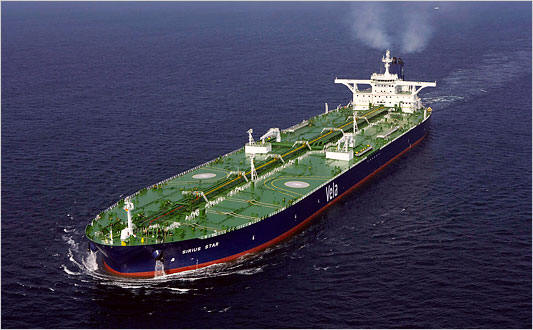|
Pirates Briefly Rattle Oil Market

Do pirates have the ability to move oil
markets?
If only for a few hours, it seems
that they can. Oil futures spiked Monday morning just as news broke
that Somali pirates had nabbed a Saudi Aramco-owned super tanker
named Sirius Star off the coast of Kenya. The huge ship can carry up
to 2 million barrels of oil.
Just before 9 a.m., oil futures
stood at $56 a barrel. By 10 a.m., they rose $3 to nearly $59. But
the price effect — if there was one — was short-lived. By noon, oil
prices were back to their now-familiar downward slide and were
trading in negative territory.
To be sure, figuring out how breaking news affects commodity and
equity markets always involves some guesswork. Other factors may
also have boosted oil prices as markets opened in New York on
Monday, including a report confirming that OPEC was making good on
recent promises to cut oil production, analysts said.
But analysts said there was great interest among oil traders in news
that pirates can disrupt major oil tanker traffic. There is some
longer-term concern that if attacks continue, they would force a
rise in insurance costs for shipping companies. In addition,
shipping costs would be significantly affected if oil companies
decide to shift their routes to avoid pirate-infested waters.
“Clearly, pirates can move the markets a little bit on a knee-jerk
reaction,” said Mike Wittner, head of oil market research at Société
Générale in London. “But in the grand scheme of things, this super
tanker is not going to change the complexion of global markets by
itself. Two million barrels mean a great deal to their owner, but
we’re talking about an 87-million-barrel a day global market for
oil, every day.”
A few shipping companies have
already begun to reroute their ships to avoid the pirates. On
Monday, the Norwegian shipping group Odfjell, which specializes in
chemical tankers, said it would shun the Gulf of Aden for the safer
if much longer route around Cape of Good Hope. There have been some
70 pirate attacks in and around the Gulf of Aden so far this year.
“We will no longer expose our crew to the risk of being hijacked and
held for ransom by pirates in the Gulf of Aden,” the company’s chief
executive, Terje Storeng, said in a statement.
Danger is nothing new to oil markets. Compared to the rebels in
Nigeria and the ongoing violence affecting pipelines in Iraq, the
Somali pirates seem relatively tame, said John Kilduff, senior vice
president at the brokerage firm MF Global in New York. But oil
traders, he said, are watching the situation.
“It is generating great interest,
but whether it is a sufficient threat to oil and energy
transportation to significantly move markets, I don’t think is
likely at this point,” he said.
Source: The New York times
|
